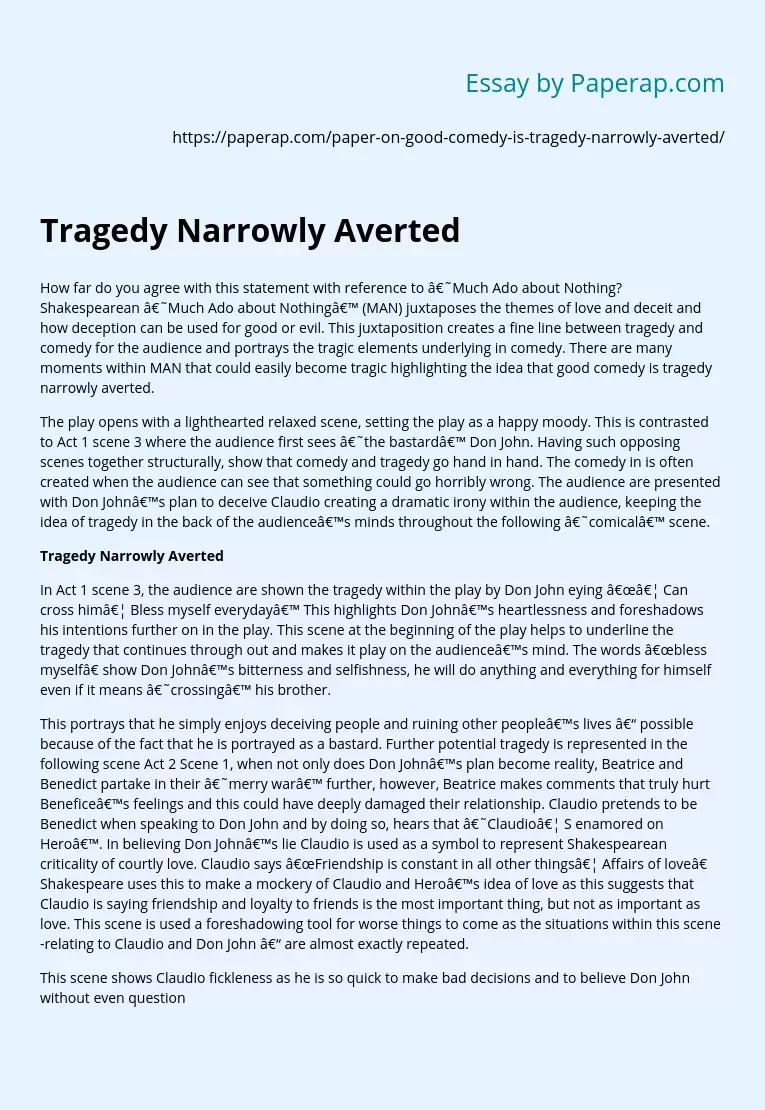Tragedy Narrowly Averted
The following sample essay on Tragedy Narrowly Averted tells about the fine line between tragedy and comedy for the audience.
How far do you agree with this statement with reference to ‘Much Ado about Nothing? Shakespearean ‘Much Ado about Nothing’ (MAN) juxtaposes the themes of love and deceit and how deception can be used for good or evil. This juxtaposition creates a fine line between tragedy and comedy for the audience and portrays the tragic elements underlying in comedy. There are many moments within MAN that could easily become tragically highlighted the idea that good comedy is tragedy narrowly averted.
The play opens with a lighthearted relaxed scene, setting the play as a happy mood. This is contrasted to Act 1 scene 3 where the audience first sees ‘the bastard’ Don John. Having such opposing scenes together structurally, show that comedy and tragedy go hand in hand. The comedy is often created when the audience can see that something could go horribly wrong.
The audience is presented with Don John’s plan to deceive Claudio creates a dramatic irony within the audience, keeping the idea of tragedy in the back of the audience’s minds throughout the following ‘comical’ scene.
In Act 1 scene 3, the audience is shown the tragedy within the play by Don John eying “… Can cross him… Bless myself everyday’ This highlights Don John’s heartlessness and foreshadows his intentions further on in the play. This scene at the beginning of the play helps to underline the tragedy that continues throughout and makes it play on the audience’s mind.
The words “bless myself” show Don John’s bitterness and selfishness, he will do anything and everything for himself even if it means ‘crossing’ his brother.
This portrays that he simply enjoys deceiving people and ruining other people’s lives – possible because of the fact that he is portrayed as a bastard. Further potential tragedy is represented in the following scene Act 2 Scene 1, when not only does Don John’s plan become reality, Beatrice and Benedict partake in their ‘merry war’ further, however, Beatrice makes comments that truly hurt Benefice’s feelings and this could have deeply damaged their relationship.
Claudio pretends to be Benedict when speaking to Don John and by doing so, hears that ‘Claudio… S enamored of Hero’. In believing Don John’s lie Claudio is used as a symbol to represent Shakespearean criticality of courtly love. Claudio says “Friendship is constant in all other things… Affairs of love” Shakespeare uses this to make a mockery of Claudio and Hero’s idea of love as this suggests that Claudio is saying friendship and loyalty to friends is the most important thing, but not as important as love. This scene uses a foreshadowing tool for worse things to come as the situations within this scene -relating to Claudio and Don John – are almost exactly repeated.
This scene shows Claudio fickleness as he is so quick to make bad decisions and to believe Don John without even questioning his claims. Claudio lack of faith in his friends within this scene can be disturbing or the audience and could be seen to present his naivety in following scenes. Furthermore, the difference between benevolent and destructive deception is questioned within the play and is a key theme. In Act 2 Scene 3, there is the benevolent deception that Beatrice and Benedict are in love with each other, it is done out of kindness for the good of Beatrice and Benedict.
However, this has the potential for disaster as it could easily become a destructive deception. Benedict says made an oyster of me… Never make me such a fool” here he is saying that a woman will never make him turn into a fool, fete reading the rest of the play this seems ironic. However, if Benedict had been truthful in what he said, then the ‘merry war between Beatrice and Benedict could become as it did in the previous scene and become bitter ruining their relationship.
Also, in Act 3 Scene 1 , the deception towards Beatrice is performed by Hero and Ursula. This is significant as Hero is first portrayed as quiet and innocent and then is shown to insult Beatrice behind her back. This could be seen in two different ways, the reader could interpret this to be as a means for Beatrice own good so that she will change who she is for Benedict, or this could be a subtle way of Hero tells Beatrice what she really thinks of her in a clever way that doesn’t look as though she is insulting her.
The method of deception for the women is a lot harsher than that of the men, they insult Beatrice and try to make him feel bad about herself by calling her “self-endeared” “an agate very vilely cut” and saying that “she cannot love” this appears to hurt Beatrice and she says that she will change who she is for Benedict. However, if the play was a tragedy, then this could have easily been taken the wrong way and hurting Benedict and Beatrice relationship further by making Beatrice believe the things that are said and possibly becoming bitter.
By describing Beatrice as “an agate very vilely cut” it suggests that she is beautiful on the inside, but her harsh persona makes her seem like a ‘shrew. An ‘agate’ is a type of semi- precious stone that is blue in color, the connotations of the color blue is that of sadness, portraying the idea that Beatrice appears sad with her life and that is why she has to change so that she can be happy with Benedict.
Tragedy Narrowly Averted. (2019, Dec 05). Retrieved from https://paperap.com/paper-on-good-comedy-is-tragedy-narrowly-averted/

